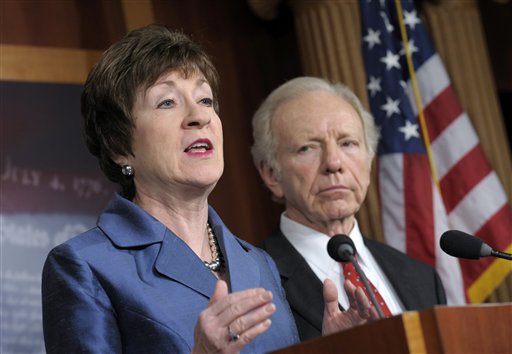WASHINGTON – A Senate report criticized the State Department on Monday for failing to heed “flashing red” warnings about terrorist threats in Benghazi, Libya, and called for stronger evacuation planning and security assessments at U.S. facilities in high-risk areas.
The report, issued by Sens. Susan Collins of Maine and Joseph Lieberman of Connecticut, also accuses the Obama administration of causing “confusion and division” immediately after the attacks on the compound in Benghazi and urges the intelligence community to avoid drafting “talking points” for administration officials in the future.
Lieberman, chairman of the Senate Homeland Security and Governmental Affairs Committee, and Collins, the committee’s ranking Republican, released the report at a news conference, saying the security situation in Benghazi was so dire that one high-ranking official described the warning signs as “flashing red.”
“The fact is Benghazi was awash in dangerous weapons and extremists and yet the State Department either ignored or responded incompletely to repeated pleas for more security, for more assistance from those on the ground in Libya,” Collins said.
The report was released days after an independent review board strongly criticized the State Department for the events leading up to the attacks on Sept. 11 that killed four Americans, including Ambassador J. Christopher Stevens.
Lieberman, an independent who will retire from the Senate this week, said it is admirable for the State Department to feel an obligation to represent the United States in dangerous places.
“But it is not responsible for us, for the government, to keep them in those very dangerous places unless we provide them with adequate security, and here we clearly did not,” Lieberman said. “So, looking back, I’d say we should have closed this facility in Benghazi until we were prepared to provide the security necessary.”
The report’s other recommendations include:
Reviewing the adequacy of local forces that help provide security at U.S. facilities. Consistent with international policy, Libyan forces were responsible for providing security outside the compound’s walls in Benghazi.
• Increased funding for diplomatic security worldwide.
• Joint crisis defense and evacuation planning by the State Department and the Department of Defense.
• A stronger presence of U.S. military personnel and security assets — whether on land or sea — positioned within range to protect diplomatic missions in Africa because of the threat posed by terrorist groups there.
On that point, Collins said it was clear from the review that U.S. forces positioned outside Benghazi could not have prevented the deaths of Stevens and another American.
But Collins said several hours elapsed before the second attack, which killed the other two Americans, a fact that she said suggests the Department of Defense has insufficient assets to respond to incidents.
“Surely we should have sufficient personnel, ships, weapons and other assets available to be able to respond in the course of several hours, particularly to an area that we know is at increasing risk of terrorist attacks,” Collins said.
Several State Department staffers left or were fired last week in the wake of the independent review board’s report on Benghazi. The new report does not call for anyone else to be held accountable, but the two senators said Secretary of State Hillary Clinton has pledged to review it.
Collins also said that, based on all of the information gathered in the investigation, Clinton did not appear to have been involved in the decisions not to strengthen security at the compound in Benghazi.
Collins has been sharply critical of the Obama administration’s initial public statements on Benghazi, particularly those by United Nations Ambassador Susan Rice in which she suggested the attacks were linked to protests over an anti-Islamic video.
Rice withdrew from consideration to succeed Clinton as secretary of state due, in part, to Republicans’ concerns over her comments on Sunday morning news programs on the weekend after the attacks.
Lieberman and Collins said their report urges the intelligence community to decline requests to provide talking points in the future.
“It is not the responsibility of the intelligence community to draft unclassified talking points for public consumption, especially in the heat of a national political campaign,” Lieberman said.
Staff Writer Kevin Miller can be contacted at 317-6256 or at:
kmiller@mainetoday.com
Send questions/comments to the editors.



Comments are no longer available on this story